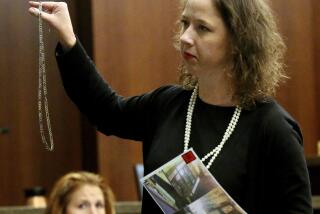COUNTYWIDE : Brown Prosecutor Warned by Judge
- Share via
Rekindling a feud between two well-known local attorneys, a prosecutor suggested in court Monday that murder defendant David Brown’s former lawyer may have played a role in Brown’s plan to assassinate key figures in the prosecution and may have tried to pay jail inmates to perjure themselves.
Called as a witness for the defense in the Brown case, the former defense attorney, Joel Baruch of Newport Beach, angrily denied the insinuations by Deputy Dist. Atty. Jeoffrey Robinson, a man whom Baruch once called “a buffoon” in court.
Superior Court Judge Donald McCartin, appearing even more irritated than Baruch, cut off the line of inquiry and, out of the jury’s presence, chastised Robinson for pursuing it.
Calling the subjects that Robinson was pursuing “crap,” the judge warned the prosecutor: “I don’t know what the hell you’re getting into.
“You’re going to be in deep trouble with me,” McCartin told Robinson. “Goddamn it, let’s get the show on the road.”
Brown, 38, now in the second month of his murder trial, is charged with orchestrating his wife’s 1985 shooting death in their Garden Grove home, then setting up his teen-age daughter to go to prison for the crime and collecting $835,000 in insurance. He later secretly married the victim’s sister.
His defense, in its first full day Monday, could end as soon as today.
Brown’s current defense attorneys called Baruch to the stand Monday in an attempt to show that the Anaheim Hills computer entrepreneur conspired to kill three key figures in his prosecution not because he was actually guilty of his wife’s murder, but rather because his defense was deteriorating. His was the desperate act of an innocent man, the defense argued.
The friction between Robinson and Baruch was evident in court Monday.
Baruch has said repeatedly that he had no knowledge of Brown’s jailhouse plans in early 1989 to hire a former inmate to kill Robinson, a district attorney’s investigator, and Brown’s current wife, who by then had become a key witness against him. The district attorney’s office said at the time that it was investigating Baruch’s possible role but never brought any charges against him.
Nonetheless, Robinson questioned Baruch vigorously on three actions that were intended to cast doubt on Baruch’s assertions of innocence:
* Baruch’s transfer of $10,000 in cash to Brown, money that purportedly was intended to buy some rare coins but that actually went to the would-be hit man.
* His departure to Florida just a day after the assassinations had supposedly been carried out.
* His contact with jail inmates in what Robinson described as an attempt to pay for perjured testimony.
More to Read
Sign up for Essential California
The most important California stories and recommendations in your inbox every morning.
You may occasionally receive promotional content from the Los Angeles Times.













